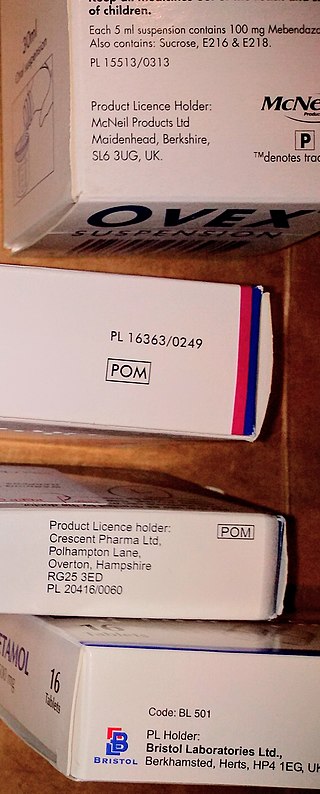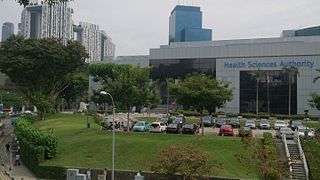The Australian Drug Evaluation Committee (ADEC) was a committee that provided independent scientific advice to the Australian Government regarding therapeutic drugs. The committee was originally formed in 1963 and more recently authorised under the Therapeutic Goods Act 1989 (Cth) as part of the Therapeutic Goods Administration (TGA). In 2010, ADEC was replaced by the Advisory Committee on Prescription Medicines (ACPM).
ADEC provided advice to the Minister for Health and Ageing and the Secretary of the Department of Health on:
An important role of ADEC was the classification of drugs in Australia into pregnancy categories.
The two main subcommittees of ADEC which were responsible for specific aspects of drug regulation in Australia:

The United States Food and Drug Administration is a federal agency of the Department of Health and Human Services. The FDA is responsible for protecting and promoting public health through the control and supervision of food safety, tobacco products, caffeine products, dietary supplements, prescription and over-the-counter pharmaceutical drugs (medications), vaccines, biopharmaceuticals, blood transfusions, medical devices, electromagnetic radiation emitting devices (ERED), cosmetics, animal foods & feed and veterinary products.

A prescription drug is a pharmaceutical drug that is permitted to be dispensed only to those with a medical prescription. In contrast, over-the-counter drugs can be obtained without a prescription. The reason for this difference in substance control is the potential scope of misuse, from drug abuse to practicing medicine without a license and without sufficient education. Different jurisdictions have different definitions of what constitutes a prescription drug.
The pregnancy category of a medication is an assessment of the risk of fetal injury due to the pharmaceutical, if it is used as directed by the mother during pregnancy. It does not include any risks conferred by pharmaceutical agents or their metabolites in breast milk.

Current good manufacturing practices (cGMP) are those conforming to the guidelines recommended by relevant agencies. Those agencies control the authorization and licensing of the manufacture and sale of food and beverages, cosmetics, pharmaceutical products, dietary supplements, and medical devices. These guidelines provide minimum requirements that a manufacturer must meet to assure that their products are consistently high in quality, from batch to batch, for their intended use. The rules that govern each industry may differ significantly; however, the main purpose of GMP is always to prevent harm from occurring to the end user. Additional tenets include ensuring the end product is free from contamination, that it is consistent in its manufacture, that its manufacture has been well documented, that personnel are well trained, and that the product has been checked for quality more than just at the end phase. GMP is typically ensured through the effective use of a quality management system (QMS).
The Pharmaceutical Benefits Scheme (PBS) is a program of the Australian Government that subsidises prescription medication for Australian citizens and permanent residents, as well as international visitors covered by a reciprocal health care agreement. The PBS is separate to the Medicare Benefits Schedule, a list of health care services that can be claimed under Medicare, Australia's universal health care insurance scheme.

Bioequivalence is a term in pharmacokinetics used to assess the expected in vivo biological equivalence of two proprietary preparations of a drug. If two products are said to be bioequivalent it means that they would be expected to be, for all intents and purposes, the same.

The regulation of therapeutic goods, defined as drugs and therapeutic devices, varies by jurisdiction. In some countries, such as the United States, they are regulated at the national level by a single agency. In other jurisdictions they are regulated at the state level, or at both state and national levels by various bodies, as in Australia.

Lumiracoxib is a COX-2 selective inhibitor nonsteroidal anti-inflammatory drug.

The European Medicines Agency (EMA) is an agency of the European Union (EU) in charge of the evaluation and supervision of pharmaceutical products. Prior to 2004, it was known as the European Agency for the Evaluation of Medicinal Products or European Medicines Evaluation Agency (EMEA).
An adverse effect is an undesired harmful effect resulting from a medication or other intervention, such as surgery. An adverse effect may be termed a "side effect", when judged to be secondary to a main or therapeutic effect. The term complication is similar to adverse effect, but the latter is typically used in pharmacological contexts, or when the negative effect is expected or common. If the negative effect results from an unsuitable or incorrect dosage or procedure, this is called a medical error and not an adverse effect. Adverse effects are sometimes referred to as "iatrogenic" because they are generated by a physician/treatment. Some adverse effects occur only when starting, increasing or discontinuing a treatment. Using a drug or other medical intervention which is contraindicated may increase the risk of adverse effects. Adverse effects may cause complications of a disease or procedure and negatively affect its prognosis. They may also lead to non-compliance with a treatment regimen. Adverse effects of medical treatment resulted in 142,000 deaths in 2013 up from 94,000 deaths in 1990 globally.
The International Council for Harmonisation of Technical Requirements for Pharmaceuticals for Human Use (ICH) is an initiative that brings together regulatory authorities and pharmaceutical industry to discuss scientific and technical aspects of pharmaceutical product development and registration. The mission of the ICH is to promote public health by achieving greater harmonisation through the development of technical Guidelines and requirements for pharmaceutical product registration.
The Adverse Drug Reactions Advisory Committee or ADRAC was a subcommittee of the Australian Drug Evaluation Committee (ADEC) which monitored the safety of medicines in Australia. ADRAC was replaced by the Advisory Committee on the Safety of Medicines (ACSOM) in 2010. In 2017, the Advisory Committee on Medicines (ACM) was established, consolidating the functions of the Advisory Committee on Prescription Medicines (ACPM), the Advisory Committee on the Safety of Medicines (ACSOM) and the Advisory Committee on Non-Prescription Medicines (ACNM).
The Therapeutic Goods Administration (TGA) is the medicine and therapeutic regulatory agency of the Australian Government. As part of the Department of Health and Aged Care, the TGA regulates the quality, supply and advertising of medicines, pathology devices, medical devices, blood products and most other therapeutics. Any items that claim to have a therapeutic effect, are involved in the administration of medication, or are otherwise covered by the Therapeutic Goods Act 1989, the Therapeutic Goods Regulations 1990, or a ministerial order, must be approved by the TGA and registered in the Australian Register of Therapeutic Goods.
The Center for Biologics Evaluation and Research (CBER) is one of six main centers for the U.S. Food and Drug Administration (FDA), which is a part of the U.S. Department of Health and Human Services. The current Director of CBER is Peter Marks, M.D., PhD. CBER is responsible for assuring the safety, purity, potency, and effectiveness of biologics and related products. Not all biologics are regulated by CBER. Monoclonal antibodies and other therapeutic proteins are regulated by the FDA Center for Drug Evaluation and Research (CDER).

The Health Sciences Authority (HSA) is a statutory board under the Ministry of Health of the Government of Singapore. It is a multi-disciplinary agency responsible for applying medical, pharmaceutical, and scientific expertise to protect and advance public health and safety.
The following outline is provided as an overview of and topical guide to clinical research:
Because of the uncertain nature of various alternative therapies and the wide variety of claims different practitioners make, alternative medicine has been a source of vigorous debate, even over the definition of "alternative medicine". Dietary supplements, their ingredients, safety, and claims, are a continual source of controversy. In some cases, political issues, mainstream medicine and alternative medicine all collide, such as in cases where synthetic drugs are legal but the herbal sources of the same active chemical are banned.

Kenneth John Harvey AM is an Australian public health doctor, currently Honorary Adjunct Associate Professor at the Institute for Evidence-Based Healthcare in Bond University. Described by The Age as an "anti-quackery crusader", Harvey is an advocate of evidence-based medicine and a critic of pharmaceutical marketing and unproven diet products. He is the president of Friends of Science in Medicine. In 2017, Harvey was awarded a Member of the Order of Australia (AM) for his "significant service to community health and the pharmaceutical industry”.
The Health Intervention and Technology Assessment Program (HITAP) is a semi-autonomous research unit under Thailand’s Ministry of Public Health. It was established in 2007 as a non-profit organization in order to take responsibility for appraising a wide range of health technologies and programs, including pharmaceuticals, medical devices, interventions, individual and community health promotion, and disease prevention as well as social health policy to inform policy decisions in Thailand. HITAP assumes an advisory role to health governmental authorities by providing rigorous scientific evidence through professional assessment of health data in support of public decision-making. These assessments cover a range of topics including system design, selection of technologies for assessment, and the actual assessment of those selected and agreed upon by relevant government agencies. In this effort, HITAP publishes research and studies in the following areas: methodological development, databases and guidelines; knowledge transfer and exchange (KTE) and capacity development; technology assessments on drugs, medical devices, medical procedures, disease prevention and health promotion measures; benefit packages of care – mixing screening and treatments; and other public health policies, e.g. evaluation of Thailand’s government compulsory license policy.
The Australian Technical Advisory Group on Immunisation (ATAGI) is a technical advisory group of the Australian Government. As part of the Department of Health, ATAGI provides advice to the Minister of Health on the immunisation program of Australia and related matters, including the strength of evidence pertaining to existing, new, and emerging vaccines.